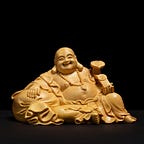Saturday Night
The phone rings. Mom answers it. It’s from Malaysia.
I go downstairs and past my father speaking in Hainanese, my mother pacing pensively beside him.
There’s a potpourri of languages spoken in the family. I grin and ask her, “Do you understand what they are saying?”
She nods and says, “I think his brother passed away.”
My jaw drops. That night, and in the days following, I notice a slight weariness, pensiveness — but not grief.
Uncle Takes a Nap
First Uncle takes a nap. His wife goes to make tea.
She calls him. No response.
She calls louder — still no response. She walks back to where he is.
His breaths are shallow and there are only exhalations. She panics, and instead of calling 999, phones their son. By the time he gets home First Uncle is gone.
How things could have been different, no one will never know.
Our Parents’ Generation
My parents’ generation reminds me of the film 活着 (Huózhe), To Live. It’s a beautiful film and highly recommended if you want to understand the history of modern China.
I suppose I’m blessed to come from a thousands-year-old culture that has the wisdom to deal with so much tragedy and strive on.
My grandparents left China before WWII but I’m aware of the tragedy China has experienced in this century: warlords, World War 2, the Civil War, the Great Leap Forward, Cultural Revolution, Tiananmen Square. So much death and destruction, and all of it needless. They've had to see so many loved ones die and still they strive on.
We must strive on. My parents’ generation strives on.
On Life and Death
Every family experiences tragedy. My aunts have had to bury their husbands.
- One dies from lung cancer
- And another from lung cancer
- A third from complications after a stroke. The stroke doesn't kill him; he dies because the ambulance takes thirty minutes to get there. Meanwhile he lays there on the road, beside his bicycle, the police waiting for the ambulance, as people go on their way.
- Third Aunt’s husband dies in a fire. He goes back into the house to save the kids, not knowing they already jumped onto a neighbouring balcony. The roof falls in and knocks him out.
- The most tragic is Fourth Aunt’s husband dying in an industrial accident. My sister called him “Uncle Fatty” and he is her favourite uncle, the most compassionate of them all.
He fell off the AMI plant roof. Everyone thought he had gone home. Much later they realize he hadn’t. No one knows if he died right away or bled to death. - And then there is Sixth Aunt’s husband. Dying slowly from liver cancer caused by smoking. A long, painful process.
Turns out Canada saved my Dad’s life.
“We come to see that every moment is life and death — that we actually live with these two merged all the time. The situation we’re in is always critical, and in each moment there’s something urgent for us to do: wake up.”
On Happiness
How can one be happy knowing the realities of life, the marks of existence?
In Canada and the First World we have “The 4 Conditions Necessary for Happiness”:
- Enough food to eat
- Clean water to drink
- A roof over our heads
- Clothes on our back
Our parents’ generation experienced a lack of all these conditions. How could they have been happy amidst tragedy and death all while experiencing this lack? What is happiness?
It isn't grief or the passing of loved ones that makes life hard to live. Rather, it is when we perceive an absence of something— an imbalance. We feel empty, confused, and despair. But life entails tragedy, misfortune and death. One must never turn away.
If we wish to taste freedom the path to emancipation is not to run away, or question why things are the way they are, or ruminate on where loved ones go when they die.
We can only be here. We cannot leave. We are always here. It is in seeing life as it is that freedom is yours.
So what do I think about death? Consider yourself a tourist.
§
